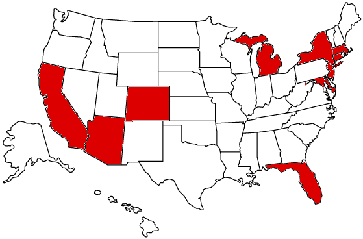All five FCC Commissioners spent more than three hours on Capitol Hill last week being questioned by the House Energy and Commerce Committee during an “oversight hearing,” which is a fancy way of saying “let members of Congress score political points by grandstanding on the FCC-related issues they care about the most.” While the hearing itself was mostly dominated by subjects such as the agency’s upcoming spectrum auctions and proposals to detach set-top TV boxes from the grip of cable service providers, two Congressfolk raised the issue of pirate radio with the Commissioners.
First was Rep. Frank Pallone (D-NJ), who’s been a very vocal supporter of increased enforcement efforts against pirate stations in the New York City metropolitan area. He announced that he plans to draft legislation to asssist in these efforts and lobbed Commissioner Michael O’Rielly a softball question on the state of pirate radio enforcement: in effect, “what should this bill include?”
O’Rielly said that “getting at the money part” of pirate radio was paramount. Many entities advertise on pirate stations; he mentioned concert and club promoters and political campaigns (?) in particular. However, O’Rielly also noted that he did not want such legislation to penalize those who may “inadvertently” assist unlicensed broadcast operations, such as landlords who may not know they’re renting space to a pirate station. Continue reading “Congress to Target Pirate Advertisers (and Others?)”
Tag: mike o’reilly
In Face of Downsizing, Are FCC Agents Pulling Back?
Can’t say for sure, but the latest update to the Enforcement Action Database seems to suggest it, as the agency considers drastically cutting their already meager ranks. As of the end of April, there’ve been just 35 enforcement actions against 17 stations in four states. There has been no official report of field activity in May. In 2014, there were 52 enforcement actions in the same time-frame.
 2014 saw the lowest level of FCC enforcement activity against unlicensed broadcasters in nearly a decade. Where agents are active, New York continues to lead the way, followed by New Jersey and California. A station in Colorado also got a warning letter this year, but that was a follow-up to a visit last year. Continue reading “In Face of Downsizing, Are FCC Agents Pulling Back?”
2014 saw the lowest level of FCC enforcement activity against unlicensed broadcasters in nearly a decade. Where agents are active, New York continues to lead the way, followed by New Jersey and California. A station in Colorado also got a warning letter this year, but that was a follow-up to a visit last year. Continue reading “In Face of Downsizing, Are FCC Agents Pulling Back?”
Should Broadcasters Sue Pirates?
In many respects, I feel sorry for FCC Commissioner Mike O’Rielly. He’s the #2 Republican on the five-member panel – the politically-weakest Commissoner. And he’s had to languish in the shadow of fellow Republican Ajit Pai, who’s commandeered the minority party’s bully pulpit on a plethora of issues ranging from journalistic independence to network neutrality.
So O’Rielly’s got to make a name for himself somehow, and he’s choosing pirate broadcasting as an issue on which to try. Last week, he published a blog post wherein he lays out some cockamamie suggestions on how to handle “the sourge” that is unlicensed broadcasting. Key to O’Rielly’s proposal is…the CAN-SPAM Act? Continue reading “Should Broadcasters Sue Pirates?”
AT&T Lightly Chastised for Airwave Piracy
Late last week the Federal Communications Commission released a Notice of Apparent Liability against AT&T for running microwave radio links without the proper licenses. These links are often used as point-to-point backhauls to move data long distances, and sometimes they are used to connect cell nodes in remote locations to the larger network.
The shenanigans first came to light in 2011, when the FCC found an AT&T microwave link in Puerto Rico that was operating on the wrong frequency. The company subsequently conducted a review and found that hundreds of its microwave links were operating outside of licensed parameters and, in some cases, were not licensed at all. AT&T claims these links were part of acquisitions it made from 2009-2012, and in simple terms neglected to file the right paperwork to adequately license them. But the scale of the problem isn’t minor: at least 240 point-to-point microwave licenses in all require either major modifications or minor modifications to be brought into compliance. All have been operating outside license parameters (or without licenses at all) for three to four years. Continue reading “AT&T Lightly Chastised for Airwave Piracy”